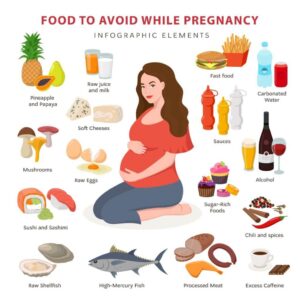Nutrition for 9 months – Lifetime of Happiness
 28867
28867

super easy
Planned and, at times, unplanned pregnancies are some of the most cherished moments in human life. Getting to know that you are going to be a mother in a few months changes everything in a whiff. You are delighted, euphoric, inspired, and the mind goes through a million thoughts and varied emotions. Every cell in the body is ecstatic. But at the same time, the sudden realization of the kind of care and caution you would have to exercise makes you doubt the fact that would you be able to do what is required of you during the next nine months? Would you be able to perform your duties well? Would you really be able to handle the responsibility loaded on your shoulders?
MommyWize brings you this article in order to help you learn a little bit more about the different and critical aspects of nutrition that you might not want to be unaware of during the next nine months. This article is a humble attempt to help you manage your pregnancy diet and food during your upcoming journey, which might not be a cakewalk.
Calories
It is essential to keep track of your calories when you are pregnant. You just cannot compromise on consuming enough calories in order to have a healthy and safe pregnancy. Nine months can seem unusually long, but you must keep at it and make sure your calorie intake is adequate. According to doctors, pregnancy can be divided into three trimesters, and each trimester has a different requirement in terms of daily calorie intake. During the first trimester, your calorie intake has to be about 1,800 calories on a daily basis. During the second and third, your daily calorie intake increases to 2,200 and 2,400, respectively. It is crucial that you keep a count of your daily calorie intake to consume enough calories ensuring a healthy pregnancy.
Diet
During pregnancy, apart from being concerned about calories, it is essential to scrupulously take care of the kind of food you consume. You cannot and must not prepare your diet and daily food intake based on a rigid pattern which consists of a certain type of food rich only in fats or only in carbohydrates or, for that matter, only in protein, as a balanced pregnancy diet is the only sensible and healthy option one must be opting for in order to maintain the good health of yours and your fetus. You must try to opt for the combination of protein, carbohydrates, fats, and necessary vitamins and minerals, which shall help you to consume a balanced pregnancy diet. Your daily diet needs to have the right amount of vegetables, fruits, cereals, bread, rice, pulses, meat, egg, milk, etc. Therefore it is essential that you consult with your doctor and prepare the right chart and strategy to ensure that you get what’s the most appropriate for you and your fetus. In case you follow a special diet such as vegetarian or vegan or gluten-free, consulting your doctor would help you decide how to manage your diet charts as per your food preferences.

Fluids
Fluids are equally essential to be concerned and careful about. As the requirement of your daily fluid intake increases unusually during pregnancy, you are required to take plenty of fluids on a regular basis. But because every human body demands a certain quantity of daily fluid intake, it is essential that you consult with your doctor. Also, make sure that you avoid fluids that are rich in caffeine or sugar or even alcohol for that matter so that your pregnancy doesn’t get affected.
Cravings
During pregnancy, you would come across situations where you might crave certain foods such as pickles, chocolate, apples, etc. According to doctors, if your diet is being followed by you in such a way that you are getting all the nutrients and vitamins you require on a daily basis to maintain healthy and safe pregnancy, you can yield to your cravings a bit. But you need to make sure that you are well within the bounds set by your pregnancy diet charts to not disturb your healthy food intake.
Some Traditional and Vedic Advice
Ayurveda is considered one of the most well developed and established science and one of India’s most significant and renowned contributions to the world at large. Not only it spoke about surgeries and operations in times when the rest of the world was still opening its eyes to the potential of humankind, but it also mentioned magnanimously about medicine, bodily fitness, spiritual healing, vicious ailments, and even about pregnancy. Ayurveda has a lot to offer in terms of managing human pregnancy. It has mentioned a full-fledged regime for pregnant women called Garbhini Paricharya. Acharya Charaka, the great Ayurvedic physician, and the surgeon have also said a great deal about the relevance and importance of milk during the crucial nine months. According to him, milk provides digestive power and bodily strength to the pregnant woman.
He has also mentioned Pathya and Satmya Ahara (favorable diet in the morning and evening), which consists of sweet, cold, and liquid food from the first to the third month. Ayurveda also mentions the importance of the optimum quantity of ghee, milk, and meat during the initial stages of pregnancy, which aids the health and radiance of the child. Payasam has also been advised as it promotes digestion and the total well being of the body. Ayurveda even mentions the importance of meat and meat soups, especially after the fourth month of pregnancy, so that the muscular tissues of the fetus develop effectively. The use of milk, ghee, honey, sweet, cold, liquid diet, and Shashtika Shali rice mixed with the milk or Krushara(soft rice) has also been prescribed.
The nine months of pregnancy can be the most demanding and can also be the most wonderful in terms of how well you manage yourself. For new parents-to-be, hearing a baby’s heartbeat is an exciting and most cherished milestone. A fetal heartbeat can be detected first by ultrasound as soon as five and a half to six weeks after gestation; this is when a fetal pole (the first noticeable sign of a developing fetus) can mostly be seen. However, between six and a half to seven weeks after gestation is an ideal time for the fetal heartbeat to be better assessed. This is also when your doctor may schedule your first vaginal or abdominal ultrasound to ensure that the pregnancy is viable.
It must be noted that one may not be able to hear a baby’s heartbeat during the first ultrasound. Typically, the reason for this may be that it is too early in the pregnancy and does not necessarily indicate a problem. Your doctor may schedule another ultrasound one or two weeks later. Ideally, your baby’s heartbeat should be between 90 to 110 Beats Per Minute (bpm) at six to seven weeks. By the ninth week, your baby’s heartbeat should reach 149 to 170 bpm.
Also Read:
Healthy Weight Gain in Pregnancy – How Much is too Much
11 Tips for Bidding Adieu to this Morning Sickness
Can a Heartbeat be Detected at Four Weeks of Pregnancy?





Leave a Reply